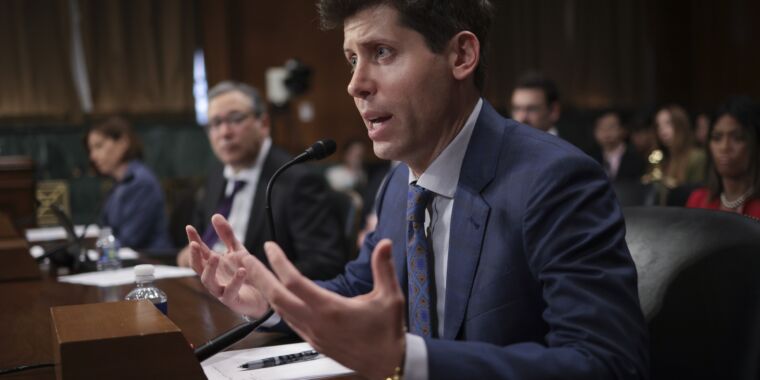OpenAI Facing FTC Investigation: A Deep Dive Into The Potential Consequences

Table of Contents
The FTC's Concerns and Areas of Investigation
The FTC, tasked with protecting consumers and ensuring fair competition, has a broad mandate encompassing a range of business practices. Their focus in this OpenAI FTC Investigation likely centers on several key areas where OpenAI's operations might fall short of regulatory standards. The investigation could explore:
-
Data Privacy Violations: A central concern revolves around the vast amounts of user data used to train OpenAI's models, like ChatGPT. Questions arise regarding compliance with regulations such as the General Data Protection Regulation (GDPR) in Europe and the California Consumer Privacy Act (CCPA) in the US. The FTC will likely scrutinize whether OpenAI obtained valid consent for data use, properly secured user information, and provided sufficient transparency about its data practices. This includes examining whether OpenAI's data collection and usage adheres to the principles of data minimization and purpose limitation.
-
Algorithmic Bias and Discrimination: AI models are only as unbiased as the data they're trained on. The FTC's investigation will likely examine whether OpenAI's algorithms exhibit biases that could lead to discriminatory outcomes for certain user groups. This could involve analyzing the model's outputs for evidence of racial, gender, or other forms of bias. The potential for perpetuating societal inequalities through biased AI is a major area of concern.
-
Misinformation and Misuse of AI: The potential for OpenAI's technology to be misused for spreading misinformation or generating harmful content is another critical area of investigation. The FTC might investigate whether OpenAI has taken sufficient measures to prevent its models from being used for malicious purposes, such as generating deepfakes or spreading propaganda. This includes assessing OpenAI's content moderation policies and their effectiveness.
-
Lack of Transparency: The "black box" nature of many AI algorithms raises concerns about accountability. The FTC investigation will likely probe the lack of transparency surrounding OpenAI's data handling practices and the inner workings of its algorithms. This includes assessing whether OpenAI provides users with sufficient information about how their data is used and the decision-making processes of its AI models.
-
Unfair Competition: OpenAI's significant resources and market position raise concerns about potential anti-competitive practices. The FTC might investigate whether OpenAI's actions have stifled innovation or unfairly disadvantaged smaller competitors in the AI market.
Potential Consequences for OpenAI
The ramifications of the OpenAI FTC Investigation for the company could be severe. Potential penalties include:
-
Fines: Significant financial penalties could be levied against OpenAI for violating FTC regulations. The amount could run into millions or even billions of dollars, depending on the severity of the violations.
-
Injunctive Relief: The FTC might seek court orders requiring OpenAI to change its practices. This could involve limitations on data collection, algorithm modifications, or even restrictions on certain aspects of its operations.
-
Reputational Damage: A negative finding by the FTC would severely damage OpenAI's reputation, impacting its brand image and eroding public trust. This could translate into loss of customers, investors, and talented employees.
-
Slowed Innovation: Increased regulatory scrutiny and legal challenges could stifle innovation and future development at OpenAI. The need to comply with regulations might divert resources from research and development.
-
Changes in Business Models: OpenAI might need to fundamentally restructure its data collection and use practices to comply with regulatory requirements. This could necessitate significant changes to its business model and operations.
Implications for the Broader AI Industry
The OpenAI FTC Investigation has far-reaching implications for the entire AI industry:
-
Increased Regulatory Scrutiny: The investigation serves as a precedent, setting the stage for increased regulatory scrutiny of AI companies globally. Governments worldwide are likely to increase their focus on regulating AI development and deployment.
-
Greater Emphasis on Ethical AI: The investigation highlights the critical need for ethical considerations in AI development and deployment. Companies will be forced to prioritize ethical AI principles, including fairness, transparency, and accountability.
-
Enhanced Transparency and Accountability: Pressure will mount on AI companies to be more transparent about their data practices and algorithms. Increased accountability mechanisms will likely be implemented to ensure responsible AI development.
-
Slowdown in AI Adoption: Increased regulatory uncertainty could temporarily slow down the adoption of AI technologies across various sectors. Businesses might adopt a wait-and-see approach until the regulatory landscape becomes clearer.
-
Shifting Landscape of AI Development: The investigation may fundamentally alter how AI models are trained and deployed, favoring more ethical and transparent approaches.
Conclusion
The OpenAI FTC Investigation is a landmark event with far-reaching implications for the future of artificial intelligence. The potential consequences for OpenAI are significant, ranging from substantial fines and injunctions to irreparable reputational damage. Furthermore, this investigation signals a growing need for stricter regulations and greater ethical considerations within the rapidly evolving AI industry. The outcome of this investigation will undoubtedly shape the landscape of AI development and deployment for years to come. Staying informed about the progress of this OpenAI FTC Investigation is crucial for anyone involved in or impacted by the AI revolution. Keep checking back for updates as this critical case unfolds.

Featured Posts
-
 880 Cv De Potencia Hibrida Conheca O Novo Ferrari 296 Speciale
May 25, 2025
880 Cv De Potencia Hibrida Conheca O Novo Ferrari 296 Speciale
May 25, 2025 -
 This Weeks Hottest R And B Featuring Leon Thomas And Flo
May 25, 2025
This Weeks Hottest R And B Featuring Leon Thomas And Flo
May 25, 2025 -
 Dutch Economy Feels The Heat Stock Market Downturn Linked To Us Trade Dispute
May 25, 2025
Dutch Economy Feels The Heat Stock Market Downturn Linked To Us Trade Dispute
May 25, 2025 -
 Housing Finance And Family Fun What To Expect At The Iam Expat Fair
May 25, 2025
Housing Finance And Family Fun What To Expect At The Iam Expat Fair
May 25, 2025 -
 Importazioni Usa Quanto Costera La Moda Nel 2024
May 25, 2025
Importazioni Usa Quanto Costera La Moda Nel 2024
May 25, 2025
Latest Posts
-
 The Sutton Hoo Ship New Insights Into Sixth Century Burial Rites And Cremated Remains
May 25, 2025
The Sutton Hoo Ship New Insights Into Sixth Century Burial Rites And Cremated Remains
May 25, 2025 -
 Apples Ceo Tim Cook A Year Of Setbacks
May 25, 2025
Apples Ceo Tim Cook A Year Of Setbacks
May 25, 2025 -
 2023 A Year Of Headwinds For Apple And Tim Cook
May 25, 2025
2023 A Year Of Headwinds For Apple And Tim Cook
May 25, 2025 -
 New Footage The Implosion Sound Of The Lost Titan Sub
May 25, 2025
New Footage The Implosion Sound Of The Lost Titan Sub
May 25, 2025 -
 Sutton Hoo Ship Burial Evidence Of Cremated Remains
May 25, 2025
Sutton Hoo Ship Burial Evidence Of Cremated Remains
May 25, 2025
